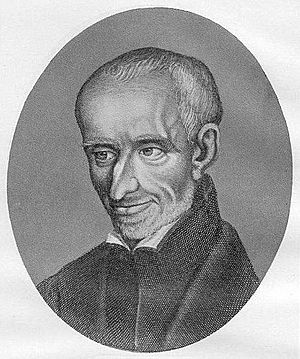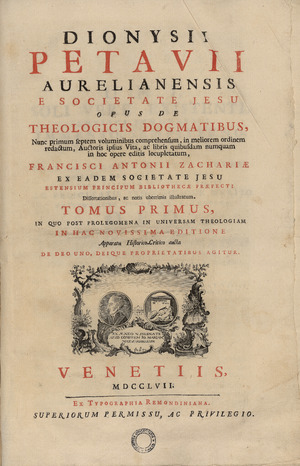Denis Pétau facts for kids
Denis Pétau (born August 21, 1583 – died December 11, 1652) was a famous French scholar. He was also known as Dionysius Petavius. Denis was a Jesuit, which is a member of a Catholic religious order, and a theologian, meaning he studied religious beliefs.
Contents
Life of Denis Pétau
Denis Pétau was born in Orléans, France. He received his first education there. Later, he went to the University of Paris. He was very smart and even defended his final papers for his Master of Arts degree in Greek, not Latin, which was very unusual.
After university, he studied theology. A professor named Nicolas Ysambert suggested he apply for a teaching job in philosophy at Bourges. In Paris, he became friends with Isaac Casaubon, who was a librarian. Denis spent a lot of his free time studying old Greek books in the royal library.
In 1603, he started teaching at the University of Bourges. However, two years later, he decided to join the Society of Jesus, becoming a Jesuit.
After joining the Jesuits, he taught rhetoric (the art of speaking and writing well) in different places like Reims and La Flèche. In 1618, he taught at the Collège de Clermont in Paris. During this time, he started writing letters to the Bishop of Orléans, discussing the early Christian Church.
From 1622, Denis Pétau taught positive theology for 22 years. This means he taught about Christian beliefs based on historical sources and traditions. He only left France twice during this period. Once, in 1629, he went to Madrid to teach history at the request of King Philip IV. Later, in 1639, Pope Urban VIII wanted him to become a cardinal in Rome.
When he was 60 years old, he stopped teaching. But he continued his work as a librarian, a job he had taken over in 1623. He spent the rest of his life working on his most important book, Dogmata theologica. He passed away in Paris.
Important Works
Denis Pétau was a very busy writer. He wrote about many subjects, including history, philosophy, and religious studies.
One of his major works was Opus de doctrina temporum, published in 1627. This book was about chronology, which is the study of arranging events in time. He continued the work of another famous scholar, Joseph Justus Scaliger. Pétau's book was so important that it was printed many times. He also made a shorter version called Rationarium temporum.
He also edited and published works by ancient Greek writers like Synesius and Epiphanius of Salamis.
Around the same time, he wrote poems in Greek and Latin. He also wrote essays that sometimes argued against other scholars like Grotius. In 1637, he dedicated his Greek verse translation of the Psalms to Pope Urban VIII.
His most famous work is the Dogmata theologica. The first parts of this book came out in 1643. The last parts were published in 1650. Sadly, the work was not finished when he died. This book was the first to try and explain the development of Christian doctrine (Christian beliefs) by looking at their history.
Many editions of Dogmata theologica have been published over the years. This shows how important it was to other scholars.
During his lifetime, Denis Pétau was especially known for his work on chronology. He even claimed to have found thousands of mistakes in another famous historical work called Annales Ecclesiastici. Many important people of his time praised his work.
Legacy
A crater on the Moon is named Petavius in his honor. This shows how much his work was valued.
See also
 In Spanish: Denis Pétau para niños
In Spanish: Denis Pétau para niños
 | Victor J. Glover |
 | Yvonne Cagle |
 | Jeanette Epps |
 | Bernard A. Harris Jr. |



